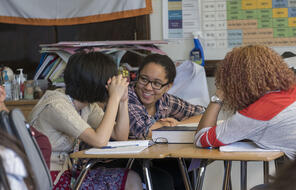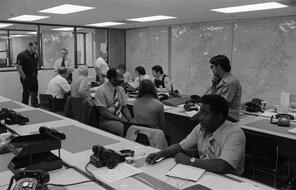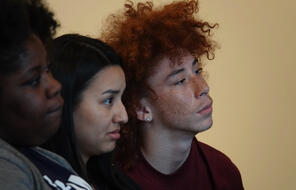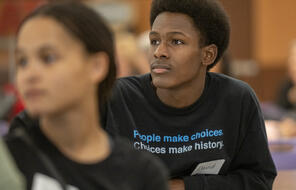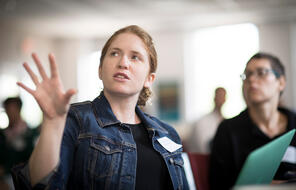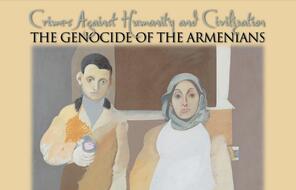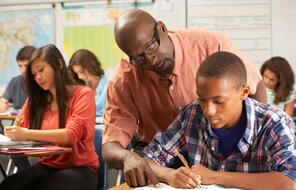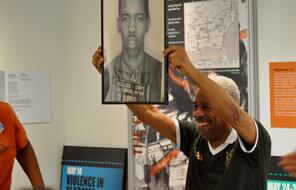Civic Education in Massachusetts
For over 40 years, Facing History has been working with Massachusetts educators to teach civics through historical case studies. Our case studies
- illuminate key aspects of democracy that are missing when the functions of government are taught in the abstract;
- reveal the complex social and political context in which governments function: the beliefs, personalities, institutions, historical legacies, and human behaviors that shape, and sometimes distort, the democratic process; and
- invite students to probe the gaps between the ideals in America’s founding documents and the history and lived realities of injustice—an approach that has been shown to effectively stimulate young people’s civic engagement.
With Facing History, students learn that the United States, in all its complexity, is the product of history and the choices people made in the past—and they discover the power of their own choices today.
A Proven Approach
A compelling body of research validates our approach to civic education. In a randomized controlled trial, Facing History was shown to significantly increase
- students’ tolerance for others with different political views,
- their capacity for civil discourse, and
- their belief that they can make a difference.
Facing History students score higher than their peers on a civic responsibility index. Facing History alumni are more civically involved than their peers: more likely to vote, to participate in a civic or community group, and to discuss current events.
Facing History’s pedagogy engages young people with challenging content through a process that builds the knowledge, skills, and dispositions of deep civic learning.
Learn More
Facing History aligns with the guiding principles of the Massachusetts framework by:
- Examining the Legacy of Democratic Government:
Our case studies demonstrate, first and foremost, the fragility of democracy itself and illustrate Judge William Hastie’s notion that democracy is “a process, not a static condition… easily lost, but never fully won.” - Including Diverse Perspectives
Our content and pedagogical approach integrates diverse perspectives, and our thematic focus on individual and group identity, found in our case studies and resources like My Part of the Story: Exploring Identity in the United States, also centers and validates students’ multiple identities and lived experiences. - Integrating Knowledge from Many Fields
Facing History provides an interdisciplinary approach that incorporates scholarship and content from history and social studies, literature, moral development, psychology, ethics, and sociology. - Teaching Students to Think Historically and Make Logical Arguments
In a randomized control trial, Facing History students outperformed the control group on their capacity to analyze evidence, cause and effect, and agency using an historical understanding assessment that asked students to analyze maps, multiple texts, and a graph. In addition, our case studies each include writing prompts and teaching strategies for the development of a formal argumentative essay. - Examining Current Events and Developing News/Media Literacy
Teaching current events can be challenging, but it’s a crucial part of students’ development as informed and engaged citizens. Resources like Fostering Civil Discourse and the accompanying on-demand webinar, and lessons on specific current issues help educators take on this difficult work as their students learn to deliberate with peers. We also have a range of news literacy resources, from individual lessons to a full case study, to help students develop media literacy at a time when news is increasingly digital, social, and fast. - Developing Social and Emotional Learning Skills
The Collaborative for Academic, Social, and Emotional Learning (CASEL) named Facing History as one of only nine middle or high school SEL programs (among nearly 400 nominated) that has a proven positive impact on students, such as increased empathy or more prosocial behavior. Facing History is just one of two cited that works at both the middle and high school level.


